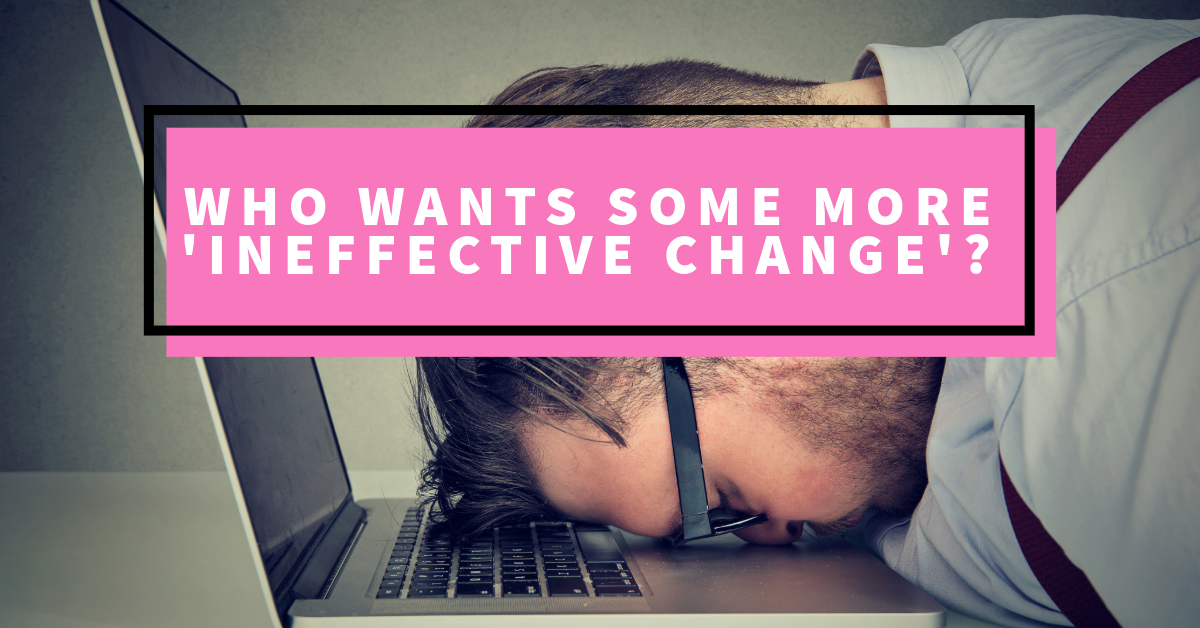Who wants some more 'Ineffective Change'?

How often do we find ourselves doing the same things over and over and expecting different results? We've all been there—both from an individual and business perspective. Consider these common scenarios:
Business Example: “We are under performing on our sales numbers!”
Solution: “Let’s bring in new people (again), pressure our suppliers (again), and ramp up marketing (again).”
While these actions are of course at times all potentially valid, they will miss the mark if you don’t address more fundamental issues first. If you're company lacks clear differentiation, a strong culture, or the ability to add significant value with its current products, these surface-level fixes won’t solve the perceived problems. Instead, they will only perpetuate poor sales behaviours (and everywhere else in the business for that matter) and hinder the ability to attract and retain top talent, only serving to start the cycle anew.
Sometimes, external factors like market changes or the timing of big new customer deals (that may have still happened anyway) can temporarily disguise the issues or give a false sense of improvement. But eventually, the same issues resurface.
Personal Example: “I need to get fitter.”
Solution: “Let’s get a new gym membership! (again)”
Three months later, we’re back where we started—or worse. The real issue isn’t the need for a new gym but rather our failure to build habits and discipline - an unwillingness to do the necessary to get comfortable being uncomfortable. To do this, we need to create an environment that quickly surfaces the behaviours, rewards and opportunities required to compel us to go again and again.

So why do the repeat cycles in these two examples happen?
Because nothing has really changed in either. The real issues have not been addressed and the harsh truth is that we are often either too limited or scared to attempt to fix on our own.
So let's agree to grasp the nettle and at least develop the awareness and humility to admit where the problems really lie!
Let's start by focusing very simply on the fundamental behaviours required to deliver the end state(s) we all want, and how we can affect them in a more balanced way.
Ways in which everyone wins and gets what they really want (and need).
Instead of waiting for someone to show us the answer or for it to suddenly appear, why don't we look at every single friction point on the user/customer journey and identify a fix to create our own high value product set? In turn naturally fueling product development cycles and automatically shaping our sales portfolios (clearly mapping out our opportunities to differentiate at the same time).
Why do we not make this type of activity the absolute priority (above all else)? Giving us the ability to enhance customer experience and therefore our ability to add value and keep sales (and profitability) high.
Instead we bury our heads in the sand and think "it will be ok", which of course it will, until it's not.
Big shifts in these areas don't happen by putting in a couple of new company values that get mentioned at "kick off" once a year, putting yet more pressure on people to “do the right thing”, chase the next “shiny thing” or revert to a “restructure” (under the same rules, philosophy and/or guidelines as the previous administration were allowed to operate).
But yet these are the things people often do, then say “they have not worked” or kid themselves into believing they have.
If you create company values, mean it, ensure you live or die by them and give everyone the platform to evidence them, and be rewarded for doing so “in plain sight”. Make sure at the individual and personal level company values and people's behaviours line up, all the time!
If someone is not on board, make it clear that this needs to change or a different type of conversation needs to be had.
If you create a new product, make it the best in its class, by first of all accepting that failure will happen several times along the way, and by being willing to put real effort and spend into it to get there.
If you do a restructure, try also changing the rules of the game so the new group can be given enough flexibility to ACTUALLY do things differently. Empower them. Trust them to help you move the needle in new ways. Don’t keep clipping their wings (especially the ones who are clearly capable, as this is why you need them, to help challenge and change things that obviously haven't worked).
Allow people room to innovate and create safe spaces to fail, give them both ownership and accountability, create a culture that thrives on supporting each other and does not tolerate toxicity (from anyone). Do not keep on taking the obvious or easy options (as they have been tried many times before and often proven not to work).
If you decide to try and get fit, create an environment which creates some "non-negotiables". Commit to doing something properly for at least 30 days so the habit and discipline required is given a chance to form, and some real-world benefit becomes tangible. Seek help to support you in doing this, get a buddy who commits to doing the same, build in rewards for achieving things, put yourself on the hook by telling people what you are about to do. Make it difficult to "reverse out".
Doing these things takes courage, awareness, humility and candour, from all involved. But nothing will ever change until these things are evidenced by individuals personally and professionally, inside and out of work, in the open for all to see.
So, how are you now going to create the right environment for meaningful change? What will you do differently to break free from the cycle of ineffective solutions?
P.S.: What’s the definition of madness again? 😊
#OpportunityToShine #TopPerformers #BehaveDifferently
